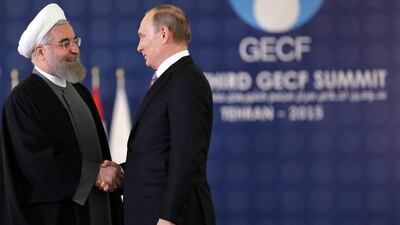Iran and Russia can relate to being on the wrong end of international sanctions. Now the pair are exploiting their economic isolation by strengthening commercial ties.
The Russian president Vladimir Putin travelled to Iran yesterday as his country pursues more than US$21 billion in exports including a potential order for the Sukhoi passenger jet.
A Russian trade delegation led by the trade minister Denis Manturov is due to visit Iran on December 15. It is expected to include several units of Rostec, the sprawling military conglomerate controlled by Sergey Chemezov, a long-time ally of the Russian president.
But warming relations between Moscow and Tehran may risk alienating Gulf states including Saudi Arabia and the UAE, who are fighting Iran-backed Houthi rebels in Yemen, say analysts.
“I think it’s pretty safe to say the Gulf will not be buying Russian weapons in large quantities for the time being,” said Michael Stephens, a research fellow for Middle East studies at the Royal United Services Institute. In a Dubai hotel meeting room, Mr Chemezov starts to chuckle when asked how sanctions have hurt him and his business.
The man who once lived in the same apartment complex as Mr Putin when they were both young KGB officers in East Germany, is determined not to take the question seriously.
After much mirth, the joke is shared. He personally has attracted so many sanctions by so many governments that he wonders if there is anyone left to apply any more.
“I think I have already gathered all of them,” he says. “I do not understand why I am so lovable in this respect.”
Russia has been strengthening relations with Iran since the Arab Spring and those ties have intensified further since the outbreak of conflict in Ukraine which triggered international sanctions against Moscow.
“As one of its early efforts, Moscow unofficially supported the activities of Russian businesses in Iran,” said Nikolay Khozanov, a lecturer in political economy and author of a report published in May by the Carnegie Moscow Center which examines the revitalisation of Russian-Iranian relations. “The Kremlin looked the other way when Russian businesses found loopholes in the US and EU sanctions regime aimed at their Iranian partners.”
Improving relations also led to the resumption of stalled exports of the S-300 missile system to Tehran.
Mr Chemezov flew to Dubai this month to use the city’s biennial air show to reveal the planned export of its S-300 surface-to-air missile system that had been mired in a long-running legal row.
The missile deal was originally signed in 2007, but deliveries were subsequently blocked by the Kremlin. That triggered a $4bn lawsuit brought by Iran against Rosoboronexport, the Rostec unit that oversees military exports. The revival of the stalled missile deal and expected withdrawal of litigation is being seen as a significant event for relations between Moscow and Tehran.
Sukhoi, the Russian plane maker, and Russian Helicopters were also displaying their aircraft at the Dubai Airshow this month. Both plan to travel to Iran next month, hopeful that the removal of international sanctions against Iran brings with it lucrative contracts as the country’s aviation industry lurches back into life.
Ilya Tarasenko, the president of Sukhoi Civil Aircraft, confirmed the company was in talks with Iran to sell up to 100 of its SSJ100 twin-engine regional jets in an interview aboard the plane at the show.
Mr Putin arrived in Tehran yesterday on what is his first visit to the country in eight years.
He is due to meet the Iranian president Hassan Rouhani and supreme leader Ayatollah Ali Khamenei. He will also attend the Gas Exporting Countries Forum, which comprises some of the world’s leading gas producers, including the UAE.
Russia has been seeking to develop investment partnerships with the UAE and in February visited the Idex defence exhibition, where Russian military manufacturers including Kalashnikov had a major presence.
scronin@thenational.ae
Follow The National's Business section on Twitter

